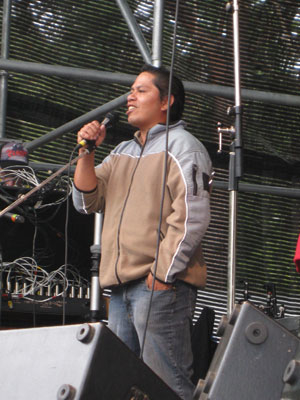
Jose Figueroa, the father of three Canadian children, has been living in Langley, B.C. as a productive and contributing member of our society for over a decade. He faces deportation because of his political activities in civil war-torn El Salvador more than 20 years ago.
Add Figueroa, then, to the list of cases in which Canada's immigration policy, distorted by fear of terrorism, is unfairly causing hardship to people inside and outside our borders.
Case in point: Immigration Minister Jason Kenney was compelled to apologize to New Delhi after visa officers barred dozens of Indian citizens from immigrating to Canada on the grounds that their service in the army or police made them complicit in human rights violations.
In another incident, Canadian officials apologized for blocking a visiting judge from El Salvador. Eugenio Chicas was detained at Toronto's Pearson airport for 24 hours in June 2009 due to his affiliation with the Farabundo Marti National Liberation Front (FMLN).
The government of El Salvador slaughtered 80,000 people in the 1980s. It used cruel violence to put down unrest caused by corruption, electoral fraud, and human rights abuses. The FMLN was the umbrella organization that led the resistance. When the war formally ended in 1992, it became a democratic political party. Today, the FMLN's leaders are the elected government of El Salvador. Mr. Chicas is a top election authority in that government.
Ignoring the truth commission
A truth commission in 1994 found that the FMLN was responsible for only a small handful of human rights abuses, and that 85 per cent of the abuses that occurred during the civil war were committed by the government. And yet Canada is routinely deporting immigrants on the presumption that the FMLN -- which defended innumerable citizens against their own rogue government -- was a "terrorist" organization.
Jose Figueroa faces deportation merely because he was a member of the FMLN in the 1980s. He never saw combat, and his role was limited to recruiting students. Yet he is held responsible today for things done by other people over two decades ago, even though his own behaviour is above reproach, as recognized by the Immigration and Refugee Board itself. (For more details, see this website.)
Jose Figueroa's case is not unique. There are numerous examples of the FMLN being designated a terrorist organization in Canadian Immigration and Refugee Board decisions.
The policy of labeling the FMLN as a terrorist organization is a slap in the face to the government of El Salvador, which ought to express its objections in the firmest language possible. It is a bizarre policy for a Canadian government seeking to engage with other nations of the Americas. And it is a profound injustice to valiant men and women who should be welcomed in our country with open arms.
Would we have blocked Mandela?
Consider this. Nelson Mandela was once labelled by South Africa's apartheid regime as a terrorist -- and if he sought to immigrate to Canada, say Jose Figueroa's lawyers, Canadian officials would be compelled by law to deny his application. Yet Canadians have proudly given him honorary citizenship.
People like Figueroa, who resisted oppression in the 1980s, were also labelled terrorists by El Salvador's brutal regime. If we recognize that the struggle for political change in El Salvador -- like that in South Africa -- was just, then we must not treat members of the FMLN as presumptive terrorists.
This may be a hard case to make given the present mood of public opinion. Public dismay over the MV Sun Sea, a freighter carrying hundreds of Tamils seeking refuge in Canada, plus the recent terror bust in Ottawa, has created a climate hostile to refugees.
Such concerns are real, but they are also unrelated. Justified indignation about one situation may lead to unjustified action in another, especially if an angry mood enables Canadian officials to do things we may later regret.
Minister Kenney recently acknowledged that our immigration law is so broad it "effectively condemns people who have never committed any crimes." The FMLN should not be painted with one broad brush, or we do precisely that.
To deport Jose, a family man who represents no threat to Canadian society, on the grounds that he was a member of a terrorist organization, victimizes someone who stood up against state terrorism. Surely that is not the intent of our laws. ![]()
Read more: Rights + Justice














Tyee Commenting Guidelines
Comments that violate guidelines risk being deleted, and violations may result in a temporary or permanent user ban. Maintain the spirit of good conversation to stay in the discussion.
*Please note The Tyee is not a forum for spreading misinformation about COVID-19, denying its existence or minimizing its risk to public health.
Do:
Do not: